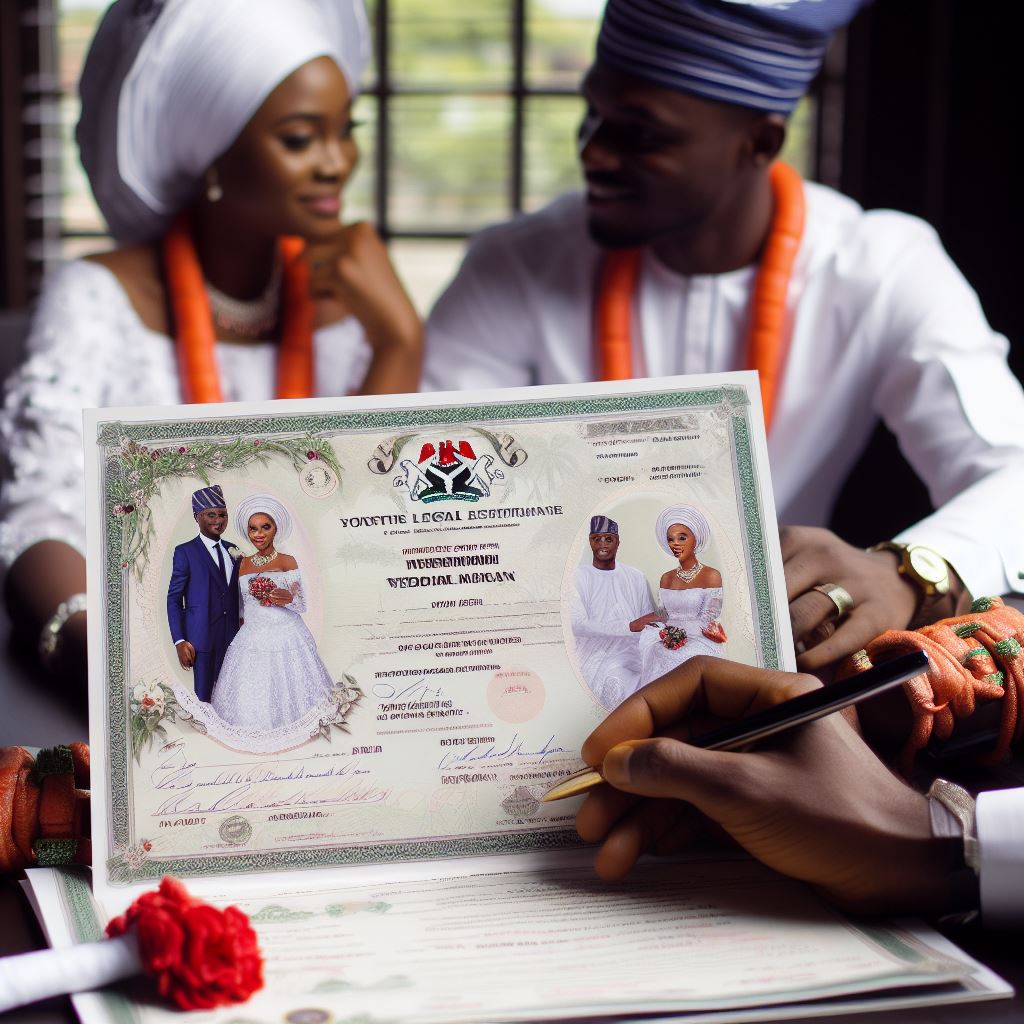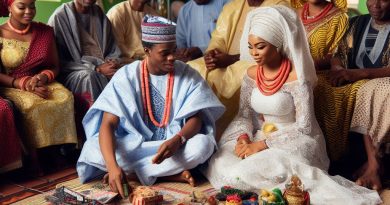The Legal Implications of Marriage Forms in Nigeria
Last Updated on January 28, 2024
Introduction
Brief overview of marriage in Nigeria
Nigeria has a rich cultural heritage with diverse marriage traditions.
Importance of understanding the legal implications of marriage forms
Understanding the legal implications of marriage forms is crucial for couples in Nigeria.
Marriage in Nigeria holds cultural and legal significance. Understanding its diverse forms and legal implications is crucial for couples.
Brief Overview of Marriage in Nigeria
- Nigeria’s multi-ethnic landscape results in diverse marriage customs, such as Islamic, Christian, and traditional ceremonies.
- In Islamic marriages, the bride price is a common practice, and consent is vital for a valid marriage.
- Christian marriages involve church blessings, and many couples opt for civil ceremonies to make them legally binding.
- Traditional marriages involve customary rituals, often unique to each ethnic group, solidifying union within the community.
Importance of Understanding the Legal Implications of Marriage Forms
- Legal recognition safeguards spouses’ rights to inheritance and property ownership, ensuring economic stability.
- In cases of divorce, legal knowledge helps resolve disputes and ensures a fair division of assets and custody arrangements.
- Legal marriages grant access to spousal benefits, including healthcare, social security, and pension schemes.
- Understanding the various marriage forms helps couples navigate their specific legal obligations and rights.
- Knowledge empowers individuals to make informed decisions and safeguards them in case of unforeseen circumstances.
In Nigeria, the diversity of marriage forms and their legal implications underscores the significance of informed choices.
Read: Igbo Marriage Ceremonies: Messages and Significance
Types of Marriage Forms in Nigeria
Customary Marriage
Definition and characteristics
- Customary marriage in Nigeria is a marriage recognized and governed by customary law.
- It involves specific cultural practices and traditions that vary across different ethnic groups.
Procedures and requirements
The procedures for customary marriage usually include payment of bride price and other traditional rites.
Legal recognition and implications
- Legal recognition of customary marriages depends on compliance with customary law requirements.
- Implications of customary marriage include inheritance rights, divorce procedures, and legitimacy of children.
Religious Marriage
Various religious marriage traditions
- Religious marriage in Nigeria refers to marriages conducted according to the traditions of various religions.
- There are different religious marriage traditions in Nigeria, including Islamic, Christian, and traditional African religions.
Differences in procedures and requirements
Procedures and requirements for religious marriages vary based on the specific religious beliefs and practices.
Legal recognition and implications
- Legal recognition of religious marriages depends on registration with the appropriate religious authorities.
- Implications of religious marriage include adherence to religious principles and potential conflict with civil laws.
Civil Marriage
Definition and purpose
- Civil marriage in Nigeria is a marriage conducted and recognized by the government through a marriage registry.
- Its purpose is to provide a legal framework for marriage that is separate from customary or religious traditions.
Procedures and requirements
- Procedures for civil marriage involve completing and submitting the necessary paperwork to the marriage registry.
- Requirements for civil marriage typically include proof of age, consent, and absence of existing marital ties.
Legal recognition and implications
- Legal recognition of civil marriages grants spouses rights and responsibilities outlined in the Marriage Act.
- Implications of civil marriage include access to divorce, alimony, child custody, and inheritance laws.
In summary, Nigeria recognizes different forms of marriage, including customary, religious, and civil marriages.
Each form has its own characteristics, procedures, and requirements. Customary marriages are governed by customary law and have implications related to inheritance and divorce.
Couples follow religious traditions in conducting marriages, and these ceremonies may carry implications aligned with religious principles.
Civil marriages are recognized by the government and grant legal rights and responsibilities to spouses. Understanding the legal implications of each marriage form is vital for couples in Nigeria.
Read: The Evolution of Marriage Ring Styles in Nigeria Over Decades

Legal Implications of Marriage Forms
Marriage is not just a union of two individuals but also a legally recognized institution that holds various implications and responsibilities.
In Nigeria, different forms of marriage exist that come with specific legal rights and obligations for the spouses involved.
Legal rights and responsibilities of spouses
- Property rights: Upon marriage, spouses have the right to jointly own and manage property acquired during the marriage.
- Inheritance rights: Spouses are entitled to inherit from each other in the event of death, as per the laws of intestate succession.
- Custody and guardianship rights: In case of divorce or separation, the court determines custody and guardianship rights over children, aiming to protect their best interests.
Dissolution of marriage
- Grounds for divorce: Certain grounds, such as adultery, cruelty, or irreconcilable differences, provide legal grounds for spouses to seek a divorce.
- Processes and procedures: The legal process of obtaining a divorce involves filing a petition, providing evidence, attending court hearings, and negotiation or mediation.
- Distribution of property and assets: Upon divorce, the court determines the equitable division of property and assets acquired during the marriage based on various factors.
Polygamous marriages
- Legal provisions and restriction: While polygamy is recognized under Islamic law in Nigeria, it is not legally recognized in other religious or customary forms of marriage.
- Rights and obligations of multiple spouses: Multiple spouses have rights and obligations towards each other, which may involve considerations such as financial support and equal treatment.
- Potential conflicts and challenges: Polygamous marriages can give rise to conflicts, including issues related to inheritance, custody, and division of resources among multiple spouses and their children.
In fact, marriage forms in Nigeria have significant legal implications. Spouses have rights related to property, inheritance, and custody.
Dissolving a marriage involves specific grounds, procedures, and property division. Polygamous marriages have their own legal provisions, restrictions, and potential conflicts.
Understanding these legal implications is crucial to ensure justice and protection for individuals within the institution of marriage in Nigeria.
In Nigerian society, marriages are not without their challenges and issues. It is crucial to highlight some of the prominent ones.
Read: Inscriptions and Symbols: Personalizing Your Marriage Ring
Challenges and Issues in Nigerian Marriages
Child marriage
- Legal age of marriage: The legal age for marriage in Nigeria is 18 years old. However, child marriages are still prevalent.
- Consequences and implications: Child marriages expose young girls to numerous negative consequences, including increased risk of domestic violence, limited education, and early childbirth.
- Efforts to address the issue: The Nigerian government and various organizations have implemented initiatives to combat child marriage, such as raising awareness and advocating for legislative reforms.
Forced and arranged marriages
- Coercion and consent: Forced and arranged marriages often involve coercion, where one or both parties lack genuine consent, leading to potential exploitation and unhappiness in marriage.
- Legal implications and protection: The Nigerian legal system recognizes forced and arranged marriages as violations of human rights, and measures have been taken to protect vulnerable individuals through legislation and interventions.
- Initiatives to combat forced marriages: Organizations and activists in Nigeria are actively working to combat forced marriages through awareness campaigns, providing support services, and advocating for stricter enforcement of existing laws.
Same-sex marriages
- Legal status and recognition: Same-sex marriages are not legally recognized in Nigeria. The Same-Sex Marriage Prohibition Act criminalizes same-sex unions, leading to discrimination and marginalization.
- Societal attitudes and challenges faced: Same-sex unions face deep-rooted societal prejudice and stigmatization, which often results in isolation, discrimination, and violence against LGBTQ+ individuals.
- Advocacy and progress towards equality: Despite significant challenges, activists in Nigeria continue to raise awareness, advocate for LGBTQ+ rights, and strive for legal and societal progress towards equality and acceptance.
Addressing the challenges and issues in Nigerian marriages requires collective efforts from the government, civil society, and individuals to promote legal reforms, awareness, and equality.
The journey towards a more inclusive and just society must continue.
Read: Nigerian Celebrities and Their Iconic Marriage Rings
Discover More: Nigeria Marriage Registry: Tips to Expedite Your Registration
Explore Further: Monogamy in Nigerian Society: Changing Perceptions
Conclusion
Recap of the legal implications of marriage forms in Nigeria
In this section, we have explored the legal implications of marriage forms in Nigeria.
Importance of understanding these implications for individuals
It is crucial for individuals to understand these implications in order to protect their rights and interests.
Call to action for further research and seeking legal advice
Recommend seeking legal advice and conducting additional research for a comprehensive understanding.
Recap of the Legal Implications of Marriage Forms in Nigeria
- Islamic, Christian, and traditional marriages coexist with their unique legal consequences.
- Legal recognition secures inheritance, property rights, and access to spousal benefits.
- Legal marriages aid in dispute resolution and equitable asset division during divorce.
Importance of Understanding These Implications for Individuals
- Informed choices protect financial stability and ensure fair treatment in case of separation.
- Legal knowledge is a shield against unforeseen challenges, offering peace of mind.
- Awareness empowers individuals to navigate their marriage forms confidently, respecting their rights.
Call to Action for Further Research and Seeking Legal Advice
- Delve deeper into your specific marriage form’s legal intricacies.
- Consult with legal experts to clarify your rights and obligations for a secure marital journey.
- Knowledge is the key to a thriving marriage – be informed, be secure.


